It might help to solve this in a more mathsy way. Imagine you are trying to come up with a line-equation for a line that graphs the score for any given index in your list of items. The x-axis would be your item indices, and the y-axis would be the corresponding scores.
Let's simplify the requirements initially - let's ignore the whole business of "the first twenty..." and "the next ten...". Let's just say the first score should be 1.0, the second score should be 0.5, the third 0.25, etc. The pattern here is pretty simple. The score starts at 1.0, and gets divided in half each single "step" we take.
The first few points that make up this line would be (0.0, 1.0), (1.0, 0.5), (2.0, 0.25) and (3.0, 0.125).
Another way of writing this would be (0.0, 1.0 / 1), (1.0, 1.0 / 2), (2.0, 1.0 / 4) and (3.0, 1.0 / 8). The pattern here is that, for each "step", the next y-value will be one over the next power of two (2**0==1, 2**1==2, 2**2==4 and 2**3==8.)
The equation for this line would therefore be: y = 1.0 / (2 ** x):

Let's reintroduce one of the requirements: The score must be cut in half for every ten "steps".
Easy. Just make x increase ten times more slowly: y = 1.0 / (2 ** (x // 10)).
Note: // means integer division, so that we're raising 2 to the power of an integer, not a floating-point number. This is equivalent to int(x / 10).
Final requirement: The first twenty items must have a score of 1.0. Starting at item# 21, the score gets cut in half every ten "steps", starting at 0.5.
You can think of this as a piece-wise function, where the function always yields 1.0 if x <= 20, otherwise it yields the computed value from our line-equation. With one small difference: We need to subtract 1 from the exponent so that our pattern starts at 0.5 at item# 21 rather than 0.25. This is because 2 ** (20 // 10) == 2 ** 2 == 4, whereas 2 ** ((20 // 10) - 1) == 2 ** (2 - 1) == 2 ** 1 == 2. Note: Item# 21 has an index of 20, since the first item has an index of 0.
In Python, you could define a function that takes an index as a parameter, and returns the corresponding score for that index:
items = ["a", "b", "c", "d", "e"] * 12 # Some items...
def get_index_score(index):
threshold = 20
return 1.0 if index < threshold else 1 / (2 ** ((index // 10) - 1))
total_score = sum(get_index_score(index) for index, _ in enumerate(items))
print(f"Total score for {len(items)} items: {total_score}")
for index, item in enumerate(items):
score = get_index_score(index)
print(f"[{index}]: {item} => {score}")
Output:
Total score for 60 items: 29.375
[0]: a => 1.0
[1]: b => 1.0
[2]: c => 1.0
[3]: d => 1.0
[4]: e => 1.0
[5]: a => 1.0
[6]: b => 1.0
[7]: c => 1.0
[8]: d => 1.0
[9]: e => 1.0
[10]: a => 1.0
[11]: b => 1.0
[12]: c => 1.0
[13]: d => 1.0
[14]: e => 1.0
[15]: a => 1.0
[16]: b => 1.0
[17]: c => 1.0
[18]: d => 1.0
[19]: e => 1.0
[20]: a => 0.5
[21]: b => 0.5
[22]: c => 0.5
[23]: d => 0.5
[24]: e => 0.5
[25]: a => 0.5
[26]: b => 0.5
[27]: c => 0.5
[28]: d => 0.5
[29]: e => 0.5
[30]: a => 0.25
[31]: b => 0.25
[32]: c => 0.25
[33]: d => 0.25
[34]: e => 0.25
[35]: a => 0.25
[36]: b => 0.25
[37]: c => 0.25
[38]: d => 0.25
[39]: e => 0.25
[40]: a => 0.125
[41]: b => 0.125
[42]: c => 0.125
[43]: d => 0.125
[44]: e => 0.125
[45]: a => 0.125
[46]: b => 0.125
[47]: c => 0.125
[48]: d => 0.125
[49]: e => 0.125
[50]: a => 0.0625
[51]: b => 0.0625
[52]: c => 0.0625
[53]: d => 0.0625
[54]: e => 0.0625
[55]: a => 0.0625
[56]: b => 0.0625
[57]: c => 0.0625
[58]: d => 0.0625
[59]: e => 0.0625
